Approving Hezbollah truce, Netanyahu says Israel will now focus on Iran
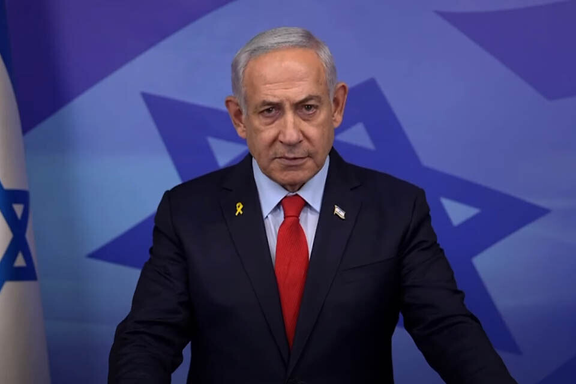
Israel and Hezbollah have agreed to implement a US-brokered ceasefire deal that Prime Minister Benjamin Netanyahu says will allow Israel to focus on Iran.

Israel and Hezbollah have agreed to implement a US-brokered ceasefire deal that Prime Minister Benjamin Netanyahu says will allow Israel to focus on Iran.
Israel's security cabinet approved the ceasefire deal on Tuesday and the whole cabinet is due to review it later in the day. Lebanon and Hezbollah have also agreed to the proposal which is expected to be implemented on Wednesday.
"The ceasefire deal with Lebanon now means Israel will focus on Iran's threat", Netanyahu said in a speech following the approval of the truce deal.
Netanyahu said there were three reasons to pursue a ceasefire: to focus on Iran, to replenish depleted arms supplies and give the army a rest and finally to isolate Hamas, whose attack on Israelis on October 7, 2023, triggered a devastating war in Gaza and saw Hezbollah join conflict with Israel.
Hitting the 'head of octopus'
Netanyahu said that he is "determined to do whatever it takes to prevent Iran from obtaining nuclear weapons."
"That threat has always been my top priority and is even more so today, (is) when you hear Iran's leaders state over and over again their intention to obtain nuclear weapons," the Israeli prime minister said. "For me, removing that threat is the most important mission to ensure the existence and future of the State of Israel."
Israel’s defense minister said earlier this month the nuclear facilities of the Islamic Republic are now more vulnerable than ever, following Israel’s October 26 airstrikes which targeted Iran’s key air defense systems.
The Israeli air raids last month knocked out Iran's last three Russian-provided S-300 air defense missile systems, Fox News reported at the time citing US and Israeli officials. The surface-to-air S-300s were the last in the Islamic Republic's arsenal after one was destroyed in an attack in April which was also likely carried out by Israel.
"We destroyed major parts of Iran's air defense system and missile-manufacturing capabilities, and we demolished a significant component of their nuclear program," Netanyahu said in his Tuesday speech, calling Iran the "head of the octopus".
Iranian authorities have consistently called for Israel's destruction and consistently refuse call it by name but refers to it as the "Zionist entity".
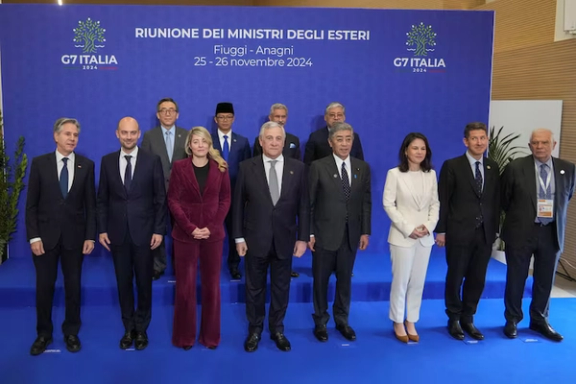
The G7 and the European Union issued a formal rebuke of Iran in a joint statement on Tuesday, condemning its military actions in the Middle East, nuclear activities, and arms transfers to Russia and the Houthis in Yemen.
The statement also reflected growing concerns among Western countries their allies over Tehran’s regional and global activities.
“We reiterate our strong condemnation of Iran’s missile attacks against Israel, which pose a serious threat to regional stability,” the statement read.
The ministers also highlighted Iran’s support for armed groups such as Hamas, Hezbollah, and the Houthis, urging restraint to prevent further escalation.
“A wider conflict in the region is in nobody’s interest.”
The G7, or Group of Seven, is an informal bloc of seven advanced economies that collaborate on global economic and political issues. Its members include the United States, Canada, the United Kingdom, France, Germany, Italy, and Japan. The European Union also participates in G7 discussions as a non-enumerated member.
The group was established to address major economic challenges of the time, such as the oil crisis and global recession, and now is aligned geopolitically against challenges from Russia and China as well as smaller players like Iran and North Korea.
The statement comes against the backdrop of a turbulent year in Iranian-Israeli relations.
In April, Iran launched Operation True Promise, a coordinated strike involving missiles and drones targeting Israel. Tehran described the operation as retaliation for an Israeli airstrike on its embassy in Damascus, which killed two Iranian generals. Israel countered with airstrikes targeting Iranian facilities, escalating tensions further.
Hostilities reached a new peak in October when Iran fired 200 ballistic missiles at Israel. Israeli forces responded with attacks on Iranian military installations, including elements of its nuclear program. Israeli Prime Minister Benjamin Netanyahu later confirmed the strikes, signaling the intensifying cycle of retaliatory violence.
Mounting nuclear concerns
The G7 also addressed Iran’s nuclear activities, underscoring their opposition to Tehran developing or acquiring nuclear weapons.
“We reiterate our determination that Iran must never develop or acquire a nuclear weapon. We will continue to work together, and with other international partners, to address Iran’s nuclear escalation.”
“A diplomatic solution remains the best way to resolve this issue,” the statement added, emphasizing what they described as Iran’s obligations under United Nations Security Council Resolution 2231.
Recent developments carry the risk of an escalation. On November 21, the International Atomic Energy Agency (IAEA) passed a resolution urging Iran to cooperate fully with inspectors.
Iran responded defiantly, activating advanced centrifuges and enriching uranium closer to weapons-grade levels. By late October, the IAEA reported that Iran’s uranium stockpile had risen to 182.3 kilograms of 60% enriched uranium, a significant step toward nuclear capability.
Weapons transfers and regional stability
The statement further condemned Iran’s provision of advanced weaponry to Russia, which has been used in the Ukraine conflict.
“Iran must immediately cease all support to Russia’s aggression against Ukraine and halt such transfers of ballistic missiles, UAVs and related technology,” the G7 ministers said.
They also decried Iran’s arming of the Houthis, saying such transfers have enabled attacks on commercial shipping in the Red Sea and Gulf of Aden.
“These maritime attacks constitute an egregious violation of international law. They have killed innocent seafarers, continue to endanger the lives and safety of crews and have exposed ecosystems in the area and coastal States to serious and grave environmental risks,” read the statement.
The G7 applauded international naval operations, including EU and US-led missions, for mitigating risks in the region.
The G7 also urged Iran to end human rights violations and cease arbitrary detentions, particularly of dual and foreign nationals.
“We reiterate our deep concern over Iran’s human rights violations, especially against women, girls and minority groups. We call on Iran’s leadership to end all unjust and arbitrary detentions, including of dual and foreign citizens, and condemn the unacceptable harassment of its citizens.”
As diplomatic efforts to address Iran’s nuclear ambitions and regional interventions continue, the G7’s unified stance signals heightened pressure on Tehran.
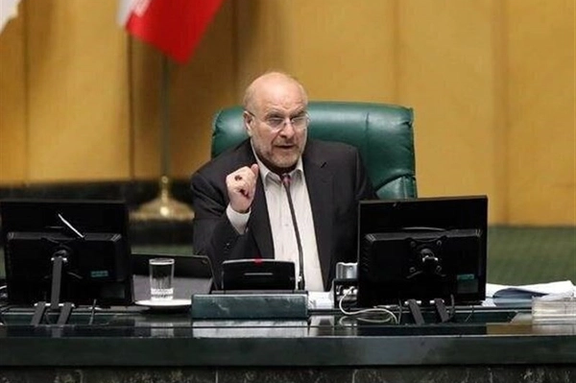
Iran’s parliament speaker has candidly warned of escalating energy shortages and called for immediate action to avert a worsening crisis as winter approaches.
Mohammad Bagher Ghalibaf’s remarks came during a review of the Energy Commission's report on seasonal power outages and fuel shortages for Iran's thermal power plants on Tuesday.
"Energy is one of the country’s significant opportunities but look at the current situation. This summer, we faced over 15,000 megawatts of consumption imbalance," Ghalibaf said, highlighting industrial production losses of 1.5% during the same period, according to the Parliament’s Research Center.
"This is detrimental to both producers and the government, as the government cannot collect taxes from their profits."
Iran’s natural gas production has slowed significantly, with a production growth rate in the past three years reaching just a third of the previous decade’s pace. Much of this slowdown stems from the aging South Pars gas field, which accounts for 75% of the country’s output but is experiencing natural declines. International sanctions have compounded the issue, preventing the acquisition of advanced production platforms.
During the winter of 2023, Ghalibaf noted, the country faced a 250-million-cubic-meter daily deficit in the gas sector, even with industry shutdowns and pressure drops.
This shortage has resulted in widespread power outages and industrial declines. Iran’s steel production, for instance, fell by 45% in the summer, while the petrochemical sector, heavily reliant on natural gas, has been operating at only 70% capacity.
Ghalibaf attributed part of the crisis to inefficiencies within the ministries of oil and energy, saying that their lack of coordination has exacerbated the problem.
“There is a conflict of interest between these two ministries. Both have grown so large that their coordination is no longer manageable by senior officials,” he said. He urged the government and parliament to collaborate with experts to resolve these institutional issues and address organized fuel smuggling, which siphons off 25 to 30 million liters of refined products daily.
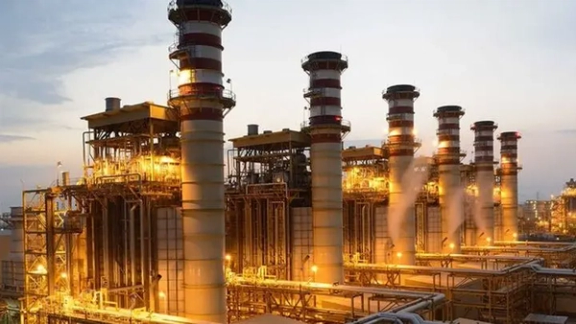
The energy shortages have had dire consequences for Iranian citizens. Widespread blackouts in residential areas have disrupted daily life, sparked public anger, and curtailed commercial activity. With 70% of the country’s energy consumption dependent on natural gas, no viable alternative exists to bridge the gap. Planned gas price increases, while potentially boosting revenue, are unlikely to significantly curb consumption given the low domestic gas prices.
Ghalibaf also touched on the international repercussions of Iran’s energy crisis. “There was a time when we could use oil as leverage against enemy threats,” he added, lamenting the loss of this strategic tool due to declining production and logistical issues.
With inflation exceeding 40% for five years, a halved national currency, and over 30 million citizens below the poverty line, the energy crisis adds yet another layer of strain to Iran’s already fragile economy.
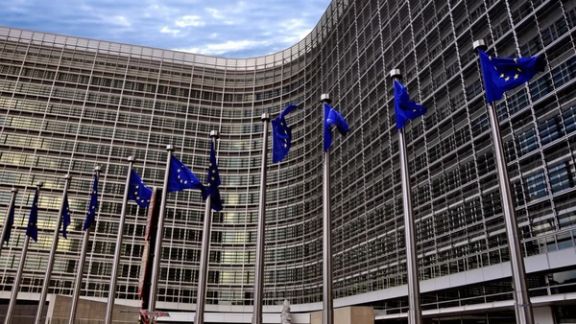
Tehran is due to hold talks later this week with the United Kingdom, France, and Germany after the UN nuclear watchdog issued a censure resolution condemning its lack of transparency and violation of obligations under a 2015 nuclear deal.
The November 21 International Atomic Energy Agency resolution stressed that its board of governors was not convinced Iran’s nuclear program is peaceful.
The resolution against Iran may prove to be a crucial step in building a case for more binding measures and potentially initiate the UN trigger mechanism that brings back all UN sanctions against Iran that were in place before the 2015 deal.
As the Iranian Foreign Ministry expressed its readiness for negotiations, some government supporters became so optimistic about the planned talks that they began circulating speculative claims, including the idea that US entrepreneur Elon Musk might participate.
However, this turned out to be a misunderstanding based on a loosely translated post on X by a Wall Street Journal reporter.
How prepared is Iran for negotiations with the Europeans?
Based on statements by some not-so-high-ranking Iranian officials, Tehran is definitely eager for negotiations, but the issue is to what extent it is willing to make concessions on three key issues: its nuclear program, support for its militant proxy forces in the Middle East and its military support for Russia's war in Ukraine.
Is Iran's nuclear program the most critical issue in talks with world powers?
Undoubtedly, as the recent IAEA resolution underscores. However, it is far from the only significant challenge in any negotiations with Tehran. Iran faces a long list of contentious topics it must address at such a high level. These include its support for regional proxies, escalating tensions with Israel, involvement in Russia's war against Ukraine, missile development programs, alleged roles in cross-border terror plots, and a troubling record of human rights violations against its citizens and dual nationals, often taken hostage for political leverage.
Is the West genuinely concerned about Iran's regional proxies following Israel's strikes on Hamas and Hezbollah?
While the strikes may have weakened these groups, as well as others in Iraq, Yemen, and beyond, they remain active and operational. Iran continues to provide financial and logistical support to compensate for their losses and consistently voices unwavering backing for them. At the same time, Tehran persists in promoting its "axis of resistance" rhetoric, which translates into a militant stance against Israel and the United States.
Is the tension with Israel over more than a month after Israel's recent strikes on Iran?
Far from it. Iranian leaders, politicians, and particularly military commanders continue to vow revenge almost daily. While some of these threats may be intended for domestic consumption to maintain the loyalty of hardline supporters, their effect on public opinion in Israel is undeniable, especially as Hezbollah and occasionally Hamas persist in launching strikes inside Israel. Moreover, there is no sign that Iran has abandoned its threats to eliminate Israel. On the contrary, such rhetoric continues unabated from Supreme Leader Ali Khamenei and other senior officials.
Is concern over Iran's contribution to Russia's war against Ukraine serious? Absolutely. In fact, it ranks as Europe's top concern regarding Tehran's hostile activities, perhaps surpassing worries about its nuclear ambitions. The entire continent is deeply troubled by a war on its doorstep that could escalate into a broader conflict. Meanwhile, European countries’ financial and military support for Ukraine has placed significant strain on their citizens, including those in the United Kingdom. Iran's military assistance to Russia exacerbates this already precarious situation, making it increasingly difficult for Europe to navigate the crisis.
But could Europe really view Iran's missile program as a serious threat?
Iranian military commanders frequently boast about their long-range missile capabilities, and recent missile attacks on Israel demonstrated their ability to strike distant targets. Unlike most nations with nuclear or conventional warheads, Iran has shown a tendency to use its missiles impulsively. It even targeted Pakistan at one point, only to retreat after a swift counterattack.
While Iranian missiles have been used against civilian targets in Saudi Arabia and Iraq fostering an illusion of power, their attacks on Israel have been largely ineffective due to Israel’s robust anti-missile defenses. Nevertheless, Europe remains concerned about the potential threat posed by Iran’s missile arsenal.
Can Europe and the United States really claim to care about human rights in Iran? The West has increasingly recognized the significance of Iranian protests, with both the US and Europe consistently condemning Tehran’s human rights violations over the past two years. Demonstrations in solidarity with Iranians have been ongoing in Western countries, and Iranian opposition figures have been welcomed at prominent international platforms, including the European Parliament and US Congress.
Human rights are likely to feature prominently in any negotiations with Iran, especially after the June 2024 presidential elections, where nearly 60 percent of Iranians boycotted the vote in protest. Meanwhile, the Iranian government is beginning to feel the pressure of a reawakening civil society. Even regime insiders have frequently cautioned leaders against further alienating the public. Most notably, the Islamic Republic newspaper—founded by none other than Khamenei himself—warned on November 25 that a revolution fueled by the hungry and disillusioned could be imminent.
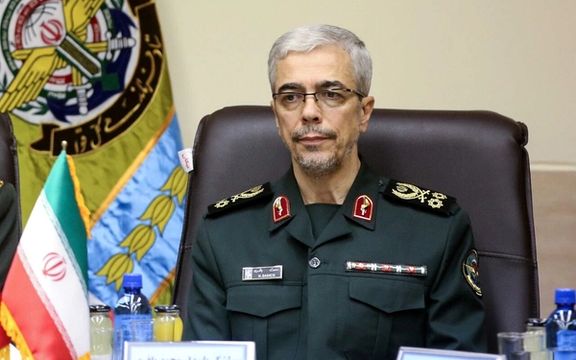
A senior Islamic Republic military commander has vowed to Retaliate against Israel's attack last month, even as ceasefire talks between Israel and Lebanon gather momentum.
"The response to Israel's recent aggression has been devised beyond what the regime's [Israeli] leaders can imagine," Chief of Staff of Iran's Armed Forces, Mohammad Bagheri, said on Tuesday. He added, "The Zionists have crossed the Islamic Republic's red lines. Iran will not tolerate any aggression against its territory and will ensure it does not go unanswered."
While Tehran has yet to take action, Israeli and US officials report that Israeli airstrikes on October 26 neutralized Iran's last three Russian-supplied S-300 air defense systems, significantly weakening its defensive capabilities. Israeli officials have asserted that Iran is now defenseless against further airstrikes, if it attacks Israel.
Tehran launched missiles and drones against Israeli twice this year, with limited impact.
Meanwhile, Israel appears close to approving a US-backed ceasefire agreement with Lebanon’s Tehran-backed Hezbollah. A senior Israeli official indicated that the deal could be finalized as early as Tuesday tonight, signaling an end to a conflict that has caused immense devastation since it escalated from the Gaza war over a year ago.
Lebanese Foreign Minister Abdallah Bou Habib, speaking at a G7 meeting in Italy on Tuesday, shared optimism that a ceasefire agreement might be reached by Tuesday night.
The proposed agreement entails an Israeli withdrawal from southern Lebanon, with Lebanese forces assuming control of the area—a longstanding Hezbollah stronghold—within 60 days. Hezbollah would in turn cease its armed activities along the Litani River’s southern border.
During Israeli strikes, Hezbollah has suffered significant losses, particularly in its leadership ranks. Coordinated attacks in September eliminated thousands of Hezbollah operatives through targeted explosions and strikes. Key figures, including longtime leader Hassan Nasrallah, were killed, weakening the group’s command structure.
Tehran maintains a dual strategy of military responses and diplomatic engagement. While military officials remain uncompromising, Iranian government leaders advocate for a diplomatic resolution. Foreign Minister Abbas Araghchi recently expressed support for a ceasefire in Lebanon, saying, "We support efforts for a ceasefire on the condition that it would be acceptable to the Lebanese people, acceptable to the resistance, and synchronized with a ceasefire in Gaza."
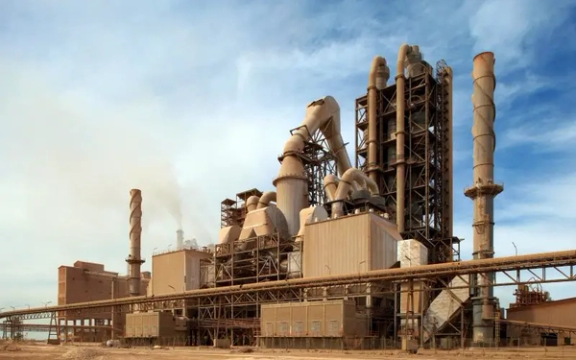
Iran's cement industry is grappling with the dual challenges of restricted natural gas supplies and reliance on environmentally harmful mazut as a backup fuel, exposing vulnerabilities in the country’s energy infrastructure.
Cement plants near metropolitan areas, barred from using mazut due to pollution concerns, have slashed production by 50%, while those in remote regions are navigating logistical hurdles to secure alternative fuels.
The disruptions come against the backdrop of a worsening energy deficit that has deeply impacted multiple industries.
Ali Akbar Alvandian, Secretary of the Cement Industry Employers' Association, highlighted the strain during a recent interview with ILNA news agency.
"Gas supplies to cement factories are limited, forcing some plants far from cities to use mazut. Those near urban centers, unable to utilize mazut, have had to halve their production," he explained.
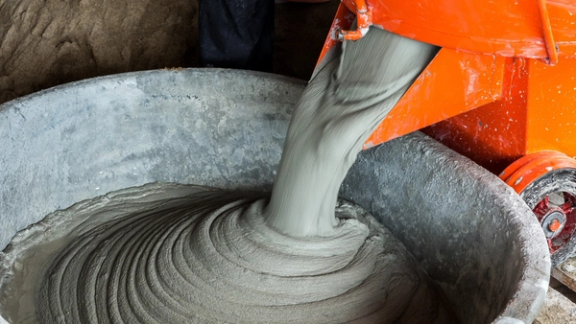
Despite the setbacks, Alvandian claimed that the market remains stable, with October’s production levels surpassing those of the same period last year. Producers, he said, are striving to ensure consistent supply despite the energy challenges.
Iran's energy deficit is not new, but its scale has become more pronounced. The country’s natural gas production growth has slowed significantly, particularly from its South Pars gas field, which accounts for 75% of output and is now in decline. Sanctions have prevented Iran from attracting the foreign investment and technology needed to offset this decline. Furthermore, inefficiencies in production and distribution contribute to an annual loss of 28 billion cubic meters of gas—equivalent to one-tenth of the nation’s annual production.
The result has been a chronic shortage of power, with blackouts impacting residential, commercial, and industrial sectors. Summer months saw electricity rationing that halted operations at 70% of cement kilns, causing supply chain disruptions.
As winter approaches, the focus has shifted to natural gas, with cuts already affecting the steel and petrochemical sectors. This has compounded existing challenges for industries reliant on consistent energy supplies.
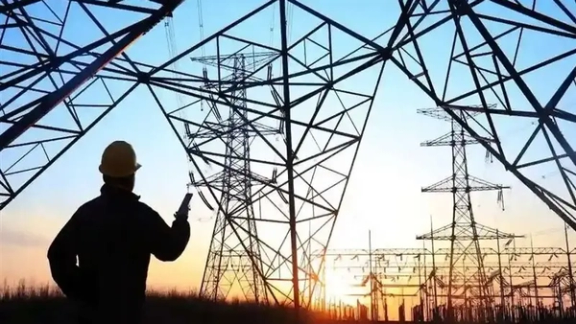
For factories located far from urban centers, mazut has become a critical alternative to natural gas. Yet, even this stopgap measure is fraught with difficulties. According to Alvandian, plants are required to source mazut from ports on the Persian Gulf, incurring steep transportation costs exacerbated by a shortage of tanker fleets.
"If these challenges persist, production could be halted entirely," he warned.
The cement industry’s struggles mirror the broader economic pressures facing Iran. Inflation has remained above 40% for five years, while the national currency has lost half its value in just two years. With at least 30 million citizens living below the poverty line, energy disruptions further strain an already fragile economy. Industrial sectors, including steel and petrochemicals—key contributors to non-oil exports—have faced severe production losses due to energy shortages.
Cement exports have also declined, with clinker exports dropping by 17% in the first seven months of the Iranian year (starting in mid-March) compared to the same period last year. Domestic markets are now being prioritized, but reduced production levels could still lead to local shortages.
The government faces difficult choices as winter intensifies. Domestic gas consumption is expected to surge to 650 million cubic meters per day, exacerbating an existing deficit of 90 million cubic meters. Planned price increases for gas might bolster state revenues but are unlikely to curb household consumption significantly due to low base rates. Meanwhile, industrial users remain at the mercy of unpredictable energy supplies, jeopardizing output and employment.
Alvandian suggested shared power outages between households and industries as a potential stopgap, though he cautioned against extending such measures into winter.
"Further electricity disruptions would affect not only industries but also residential areas, leading to broader economic and social challenges," he added.
Iran’s energy crisis, rooted in years of underinvestment, inefficiencies, and sanctions, presents a formidable barrier to economic recovery. The cement industry’s struggles are emblematic of the larger pressures facing the country.